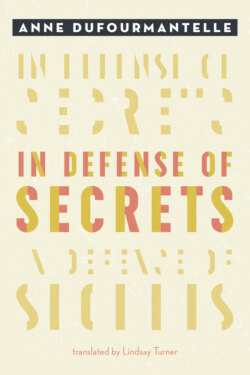Читать книгу In Defense of Secrets - Anne Dufourmantelle - Страница 16
На сайте Литреса книга снята с продажи.
ОглавлениеThe Unavowable
We have entered into a civilization of confession—that is, of the unavowable. Those who have neither the means nor the psychic materials to cope are relegated to the status of have-nots. The lower classes are no longer so by birth or by heritage but because they do not sufficiently fill the function assigned to them in social organization. Those who do not enter into the technological era with enough ardor—who are not happy to be decoded, protected, and therefore surveilled, surveilled and therefore suspect—are left out. Never explicitly named, this setting aside nevertheless occurs through violent and silent segregations. It erects a border between those our age will keep and those who will be left behind. The trafficking of bodies, ideas, money, stories, values, objects, and human lives is thriving as never before.
In the tools of communication, produced en masse by nanotechnologies, individuals have found a way to increase their power, without seeing that they carve out dependency and powerlessness between themselves.
What do we consider to be unavowable? Everything begins in childhood, that territory striated by multiple intensities. Every childhood is infused with hidden things: moments of pleasure and shame, illicit discoveries, illuminations, frights. Each day is the occasion of a discovery. In Totem and Taboo, Freud meditates on Frazer’s Golden Bough and on what remains in us of the magic rapport that we can have with the world as it is rooted in childhood. He comes to the conclusion that the animist relationship of so-called primitive people to the world resembles the young child’s, sheltered by rituals from the harrowing chaos of their internal desires, making the child into a soldier in an imaginary battle against invisible forces. Comfort objects and other “hobby horses” (Tristram Shandy) become a social link in the face of the real. Totemization is an essential process of human socialization. Like the constitution of the fetish in object relations, it circumscribes a possible space for relations of love and power between beings. It lets sexualized bodies and relations between those bodies circulate, and it separates the living from the dead. Its order is precisely that of the secret. The forbidden that it represents cannot even be formulated: It is absolute.
Confession becomes the norm, and the unavowable thus what could potentially be reproached for “separating” itself from the flows of communication. Our new totems are Facebook, Instagram, Twitter, etc.
What is dissimulated is sometimes deadly, whether it is that the child cannot commit themselves to saying what they have done or what has been done to them, or whether it is that they must receive a confession much too heavy for them. The ambivalence of their own desire or hate will persist in the adult they will become, in the form of more or less complicated scenarios destined to organize these contradictory affects in a “plausible” way.
The unavowable exists in the movements of desire and fear as well as in the ambivalences of love and hate. The consciousness tries to see clearly, attempting to unveil those hidden controls that operate, unknown to us, and at the risk of unleashing a repressed violence in the proceedings of welcoming and receiving the other (and especially in the case of any type of stranger). Unveilings are not without risk; the subject discovers that they are beholden to loyalties that “work upon” them, adorations that captivate them, hates that might annihilate them. Is it necessary to descend into these crypts to bring them to light? At what price would we know everything about ourselves?
